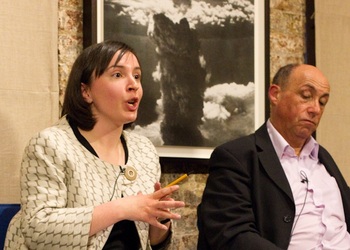Pic credit: Chris King, Kat Banyard and Ivor Gaber at the Frontline.

If there's one word the British people probably don't want to hear any more, it's change. But - bear with us - with less than 12 hours to go before the polls close, the question a Frontline Club panel tackled last night was: is this really a change election?
If you couldn't be with us for this event, you can watch the whole thing here:
For Vernon Bogdanor, professor of government at Oxford University it's been "a disenchanted election" that may have excited the media and political enthusiasts but not ordinary voters. He said:
For us pundits it's very fascinating but for the public it's a real turnoff... The three parties will all be losers and the electoral system will be a loser too because it will be the second time a government is elected on less than two thirds of the vote.
Bogdanor credits three-time election winning Tory Prime Minister Margaret Thatcher for understanding how the "old blocs" of socio-economic loyalty to political parties was breaking up.
But without a simarlarly populist ideologue to attract cross-society support this time round, we are left with the most unpredictable of elections, he said. And without reform of the electoral system, he was sceptical that anything could really change in the next parliment.
Political journalist and academic Ivor Gaberwas more optimistic about the transformation of the public's relationship with politics in the last month:
Whatever happens to the Lib Dem vote tomorrow there has never been a party that has gained ten or 11 percent (in the opinion polls) overnight; that was psephelogical history.
Public opinon was reasserting itself over and against the media to take an autonomous step. We're seeing a real re-awakening in public opinion
Women: seen but not heard
Kat Banyard, author and co-director of UK Feminista, had a dose of reality about the gender split in frontline politics: men run the show and it will take electoral reform and positive action to change anything.
Some of the most visible women in this campaign have been the leaders' wives: "We have seen women in this election but they've generally been married to the man on the screen - it shows a sterotypical attitude... and their role revolves around primary caring."
The overall project increase of women MPs in this election is just three percent, up from from 20 percent in 2005 (see this chart for historical data). Banyard points out this is "only possible because lots of MPs are retiring".
For women to affect change in male-dominated [system] you need a base level of representation... the only good thing to come out of it is that people are noticing.
Race relations
The other issue conspicusly absent from this campaign has been that of social equality and race: Ivor Gaber questioned the need for all-black shortlists, asking what a middle class British Hindu has in common with a working class Afro-Caribbean candidate. "Just because someone is black brown or whatever, it doesn't mean they are going to do a better job," he said.
Ashok Viswanathan, deputy co-ordinator, Operation Black Vote, said he was hoping for a breakthrough of between 25 to 30 black and ethnic minority MPs, which could double the current number of 14. He said the difference between this and previous election is that black candidates are standing in winnable seats, for both the main parties.
Bogdanor then highlighted an issue that played only a minor role in the campaign so far, thanks to the Lib Dem surge: the success of the BNP. "What hasn't been noticed is how much better the BNP is doing than Mosley's blackshirts did in the 1930s. He never got anywhere near winning a [General Election] seat, a council seat or even a by-election, but the BNP already have councillors."
System leaves voters disenfranchised
There was - quite worryingly from a democratic point of view - mumurs of agreement when an audience questioner admitted: "I have no idea what the polticial system is in this country and neither do my mates. I don't know what PR is, I don't know is going on..."
Unless the system is reformed so that MPs are elected according to how many people vite for them, the misunderstanding and apathy could only increase, the panel agreed.
Bogdanor summed up the dilemma: "By definition, people are disenfranchised. You could put up a donkey in some constituency, call it Labour or Tory and it would win." He pointed out that the safe seat of Blackburn has had just two MPs since the war - Barbara Cartland and Jack Straw - despite many voters supporting other parties.